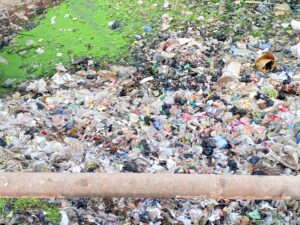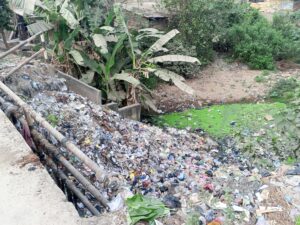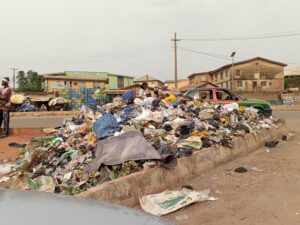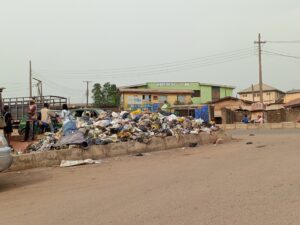![]()
– Adejola Adeyemi Crown
For residents of Arinlese-Saje in Abeokuta, Ogun State, indiscriminate waste dumping has become a norm, with a major drainage channel now transformed into an unofficial dumpsite.
The situation has sparked concerns among community members and environmental experts, as the accumulation of waste poses serious health and environmental risks.
The sight of overflowing refuse has not only become an eyesore but also a breeding ground for diseases.
A visit to the area paints a troubling picture—heaps of waste, ranging from household trash to plastic materials and decomposing food, clog the drainage meant to channel stormwater.
The offensive smell fills the air, making life unbearable for those living close to the drainage. Flies hover over the garbage, while stagnant water pools in some sections of the blocked drainage, increasing the risk of waterborne diseases such as cholera and typhoid.

When our correspondent visited the community, it was observed that a waste container had been placed at Saje Junction, but many residents were not making use of it. Those who used it complained that the container was too small to cater to the volume of waste generated in the area.
Some residents said the container filled up too quickly, forcing people to resort to dumping refuse in the drainage.
Residents say the problem has been worsening over time, with little to no intervention from the authorities. While some blame the government for failing to provide adequate waste disposal options, others argue that the residents themselves are responsible for the mess, citing indiscriminate dumping as a result of poor hygiene culture.
Mrs. Funmilayo Adegbite, a trader who has lived in the area for over a decade, expressed deep concern about the situation.
She lamented that the drainage, which was designed to prevent flooding, had now been turned into a dumpsite, putting the entire community at risk. “This is a disaster waiting to happen”.
“When the rains come, this place will be flooded, and we will suffer the consequences. The stench is unbearable, and it is already affecting our health”, she said.
The situation has become even more alarming as children, unaware of the dangers, are often seen playing near the polluted drainage. The fear among parents is that they could contract serious illnesses from their exposure to contaminated water.
Malaria, caused by mosquitoes that breed in stagnant water, is already a common issue in the community, and many believe the waste-clogged drainage is making it worse.

Mr. Lateef Olayiwola, another resident, stressed that the problem was compounded by the lack of designated refuse collection points. “The truth is, people dump their waste here because there are no alternatives. The government needs to provide more waste bins and ensure regular refuse collection,” he said.
However, not all residents agree that the problem is solely due to government neglect. Some argue that many people simply refuse to dispose of their waste responsibly. Mrs. Titi Olaniyan, a shop owner, believes the problem is self-inflicted.
“Some of us have waste bins, yet some people still prefer to throw their dirt into the gutter because they are too lazy to dispose of it properly. This is not just about the government; it’s about people’s attitude towards cleanliness,” she said.
The blocked drainage poses not just a health hazard but a serious environmental threat.
Other residents warned that the obstruction of water flow will lead to severe flooding once the rainy season begins. With no clear pathway for stormwater, roads and houses in the area are at risk of being submerged.
A resident who spoke on condition of anonymity stressed the urgency of clearing the drainage before it becomes a disaster. “Flooding is a real threat here. If this drainage remains clogged, when the rains come, the water will overflow into people’s homes and destroy properties. The government needs to act fast,” he said.

Residents of Arinlese-Saje, however, do not want a repeat of the kind of flooding that often occurs in some parts of the Abeokuta metropolis. Many have expressed fear that if the drainage remains blocked, their community could be next in line for such disasters.
“We have seen what happens when drainages are blocked in other parts of Abeokuta. We don’t want that to happen here,” said Mr. Kehinde Owoeye, a commercial motor driver.
“The government must act now to prevent another disaster. They should clear this drainage and also penalize those who dump waste indiscriminately.”
While calls for government intervention grow louder, residents are also demanding increased public awareness about the dangers of poor waste management.
Many believe that sensitization campaigns will help change people’s attitudes towards waste disposal. “A lot of people don’t realize the dangers of what they are doing. They need to be educated on the consequences of dumping waste in drainages,” said Mrs. Adegbite.
“The government and community leaders should collaborate to organize awareness programs so that people will understand that their actions can have deadly consequences.”
Efforts to reach officials of the Ogun State Waste Management Authority (OGWAMA) for comments were unsuccessful as of press time.


























